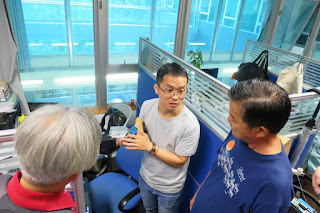The technical visit to CUHK
T Stone Robotics Institute was co-organized by Joint Event with Informatics and
Control Technology Section, IET Hong Kong and IEEE Electronics Packaging
Society (IEEE-EPS) on 6 July 2018. The
CUHK T Stone Robotics Institute was established in Nov 2015, as one of the
University’s strategic initiatives, with the strong support from the university
and a generous donation from T Stone Group Limited to provide a platform for
research collaboration and collective development in robotics and
automation. The objective is to build a
world-class institute that plays leading roles in global robotics research and
contributes to technological and societal development in Hong Kong and mainland
China. I took a photo in front of the
institute for memory.
Firstly, we visited the research
named “A robotic assistant for total laparoscopic hysterectomy” that aimed to
assist the surgeon in uterus positioning during a Total Laparoscopic Hysterectomy
(TLH) that is the procedure of moving the uterus from a female patient. Dr. Zerui Wang (Research Assistant Professor,
Department of Mechanical and Automation Engineering, CUHK) explained and
demonstrated this research to us.
Then Dr. Darwin Tat Ming
Lau (Assistant Professor, Department of Mechanical and Automation Engineering,
CUHK) showed different cable-driven robots and explained their principles to
us.
A student demonstrated how
to collect data during raising arm. It
could help us to understand our brain response on different situations.
Cable-driven Robots work with a type of parallel mechanism where multiple cables are attached to an end-effector in parallel. The demonstration was to move 20kg weight in different locations.
A larger scale Cable-driven
Robots was demonstrated too. It could
carry laser cutter for different function.
In Prof. Raymond K.Y. Tong’s
laboratories, research staff showed us a six-phase-angle-driven FES cycling
system with subject-specific control algorithm for a 20-year old female spinal
cord injury (SCI) volunteer with thoracic spinal fracture to exercise and
improve the physical condition of her lower limb.
Research student explained
his research on Prosthetic Limb which detect the balance data and assist walk
posture.
Another research student
showed wearable exoskeletons for motion assistance and rehabilitation.
The last laboratories we
visited named “CUHK-BIT Joint Research Centre for Optomechatronic Design and
Engineer” (BIT – Beijing Institute of Technology). They designed different
tools for surgery use.
The first generation micro
surgery system.
I took a selfie for memory.
At the end, we took a group
photo for IET and IEEE.
Reference:
20180602: IET & IEEE
Technical Visit to Songshan Lake International Robot Industry Base and Googol
Technology Park - https://qualityalchemist.blogspot.com/2018/06/iet-ieee-technical-visit-to-songshan.html
20170310: Technical Visit
to EPACK Lab and JC Controlled Environment Test Facility - https://qualityalchemist.blogspot.com/2017/03/technical-visit-to-epack-lab-and-jc.html














沒有留言:
發佈留言